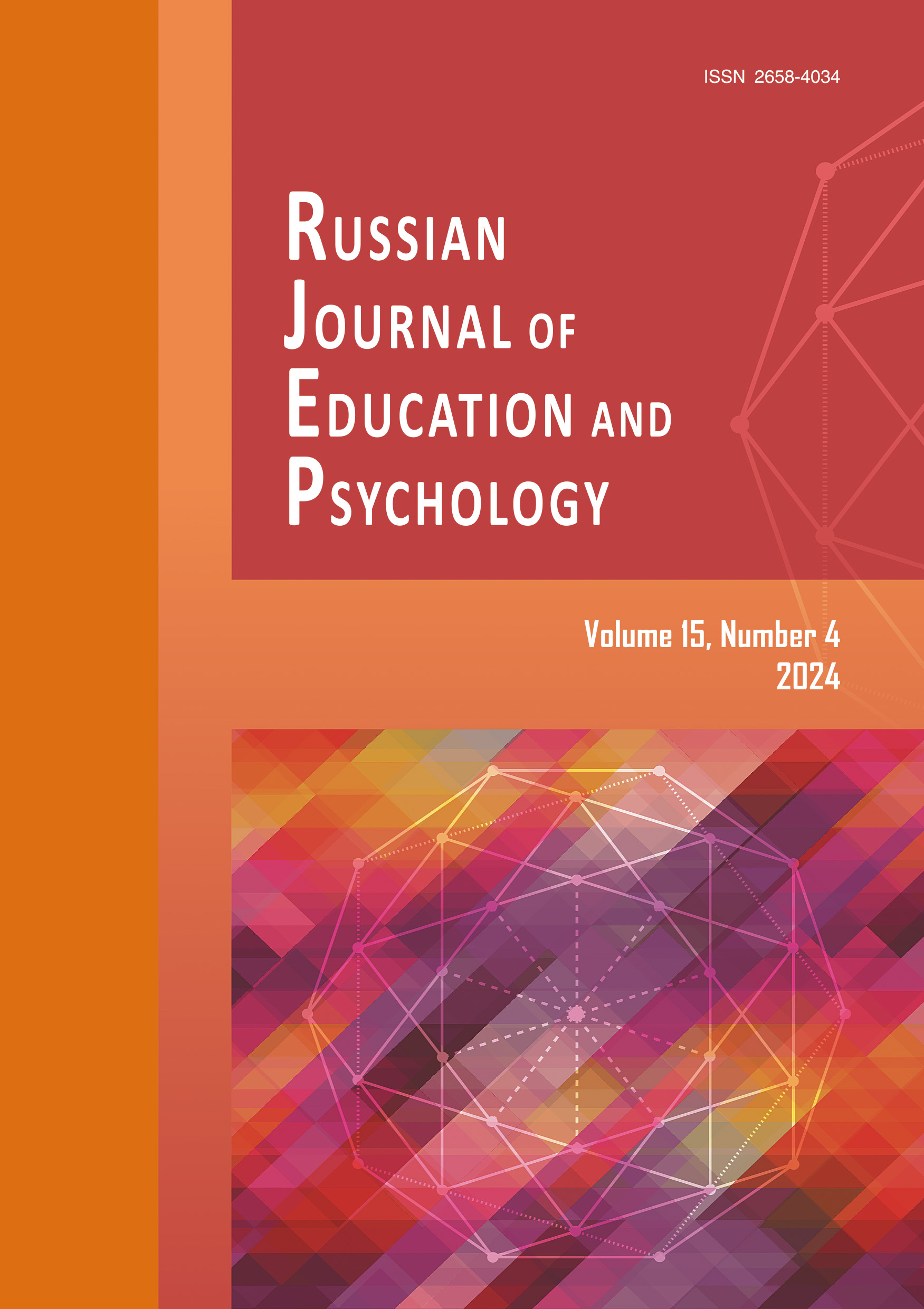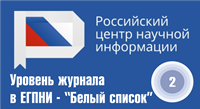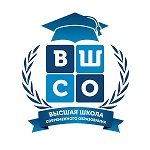ФОРМИРОВАНИЯ НАВЫКОВ СИСТЕМНОГО МЫШЛЕНИЯ В УСЛОВИЯХ ВОЗДЕЙСТВИЯ КЛИПОВОГО МЫШЛЕНИЯ НА ПРОЦЕСС ОБУЧЕНИЯ ИНОСТРАННОМУ ЯЗЫКУ
Аннотация
Обоснование. Современное высшее образование ориентировано на создание условий для формирования навыков системного мышления и снижение отрицательного влияния клипового мышления на познавательные способности молодого поколения. Цифровые технологии способствуют развитию у студентов таких умений, как многозадачность, быстрота реакции, высокая степень адаптивности, но также негативно влияют на восприятие окружающего мира, студенты перестают анализировать принимаемую информацию и не стремятся составлять целостную картину из полученных фрагментов.
Цель - выявить психолого-педагогические условия для формирования навыков системного мышления и снижения отрицательного воздействия клипового мышления на процесс обучения иностранному языку.
Материалы и методы. Исследование проведено методом анализа научной, учебно-методической литературы и педагогического опыта формирования когнитивной компетенции у студентов высших учебных заведений. В статье интерпретируются, анализируются и обобщаются теоретические положения и опыт практики формирования у студентов навыков системного мышления, а также изучается влияние клипового мышления на познавательный процесс на занятиях по иностранному языку.
Результаты. Автором были обозначены основные трудности в обучении, вызванные отрицательным воздействием клипового мышления, и предложены психолого-педагогические условия для их минимизации и формирования навыков системного мышления. В основу психолого-педагогических условий положена реализация проблемного обучения через решение коммуникативных задач в процессе изучения видовременных форм английского глагола. Полученные результаты исследования вносят вклад в методологию и технологию современного профессионального образования, расширяют представление о роли проблемных коммуникативных заданий на занятиях по иностранному языку и говорят о необходимости опоры на способности студентов к многозадачности и механизму адаптации к информационным перегрузкам.
Скачивания
Литература
Список литературы
Бухарбаева А.Р., Сергеева Л.В. Клиповое мышление поколения Z: методы развития творческого потенциала студентов // Вестник Российского университета дружбы народов. Серия: Литературоведение. Журналистика. 2020. Т. 25. №4. C. 787-796. https://doi.org/10.22363/2312-9220-2020-25-4-787-796
Гиренок Ф.И. Клиповое сознание. М.: Академический проект, 2014. 249 с.
Зимняя И.А. Учебная деятельность как специфический вид деятельности // Инновационные проекты и программы в образовании, 2014. №1. С. 3-14.
Ковалевская Е.В. Проблемность в преподавании иностранных языков: Современное состояние и перспективы: Учебник для вузов. М.: МНПИ, 1999. 120 с.
Матюшкин A.M. Психология мышления. Мышление как разрешение проблемных ситуаций: Учебное пособие / Под. ред. А.А. Матюшкиной. М.: КДУ, 2009. 190 с.
Махмутов М. И. Организация проблемного обучения в школе. Книга для учителей. М.: Просвещение, 1977. 240 с.
Меерович М.И., Шрагина Л.И. Системное мышление: формирование и развитие. Учебное пособие. М.: СОЛОН Пресс, 2019. 276 с.
Меерсон A.-Л. С. Разработка тренинга по формированию информационно-психологической устойчивости личности студентов вуза // Russian Journal of Education and Psychology. 2022. Т. 13, №1. С. 154-176. https://doi.org/10.12731/2658-4034-2022-13-1-154-176
Семеновских Т.В. Феномен «клипового мышления» в образовательной вузовской среде // Интернет-журнал «Науковедение». М.: Науковедение, 2014. №5 (24). URL: http://naukovedenie.ru/PDF/105PVN514.pdf (дата обращения: 31.05.2024).
Спивак В. А. Системный подход и системное мышление как универсальная компетенция специалиста и руководителя: монография. Чебоксары: «Среда», 2022. 136 с.
Сычев И.А., Сычев О.А. Понятие системного мышления в зарубежной науке // Мир науки, культуры, образования. 2011. №2(27). С. 249-251.
Теория медиа Маршалла Маклюэна: как мы оказались в глобальной деревне? // Портал «Моноклер». URL: https://monocler.ru/teoriya-media-marshalla-maklyuena/ (дата обращения: 28.01.2024).
Фрумкин К.Г. Клиповое мышление и судьба линейного текста // Ineternum. 2010. №1. URL: https://web.archive.org/web/20120621080523/http://nounivers.narod.ru/pub/kf_clip.htm (дата обращения: 25.05.2024)
Цветкова Т. К. Как преподавать английский язык. Книга для преподавателей: Метод. пособие. Москва: Проспект, 2005. 95 с.
Шпак Н.О. Применение проблемного обучения при формировании коммуникативной компетенции будущих менеджеров // В мире научных открытий. 2014. № 11-7 (59). С. 2798-2812. https://doi.org/10.12731/wsd-2014-11.7-2798-2812
Шпак Н.О. Роль коммуникативной задачи в развитии навыков XXI века на занятиях по иностранному языку // Russian Journal of Education and Psychology. 2022. Том 13. №1. С. 89-100. https://doi.org/10.12731/2658-4034-2022-13-1-89-100
Alvin Toffler. The Third Wave. New York, NY, 1980, 560 pp.
Di Fabio A., Rosen M.A. An Exploratory Study of a New Psychological Instrument for Evaluating Sustainability: The Sustainable Development Goals Psychological Inventory // Sustainability. 2020. Vol. 12. № 18, 7617. https://doi.org/10.3390/su12187617
Stice, James E. Teaching problem solving. https://inst.eecs.berkeley.edu/~ee301/fa13/Readings/teaching_problem_solving_stice.pdf (дата обращения: 27.05.24)
Rosen L. Me, my Space and I: Parenting the Net Generation. N.Y., 2007. 272 pp.
Schimmenti A., Caretti V. Psychic retreats or psychic pits?: Unbearable states of mind and technological addiction // Psychoanalitic Psychology. 2010. Vol. 27(2). P. 115-132. https://doi.org/10.1037/a0019414
Shuell, Thomas J. Teaching and Learning as Problem Solving // Theory into Practice, vol. 29, no. 2, 1990, pp. 102-108. URL: https://www.sci-hub.ru/10.1080/00405849009543439 (дата обращения: 27.05.24)
References
Bukharbaeva A.R., Sergeeva L.V. Clip thinking of generation Z: Methods of developing students’ creative potential. Vestnik Rossiyskogo universiteta druzhby narodov. Seriya: Literaturovedenie. Zhurnalistika [RUDN Journal of Studies in Literature and Journalism], 2020, vol. 25, no. 4, pp. 787-796. https://doi.org/10.22363/2312-9220-2020-25-4-787-796
Girenok F.I. Clip consciousness. Moscow: Akademicheskiy proekt Publ., 2014, 249 p.
Zimnyaya, I.A. Educational activity as a specific type of activity. Innovatsionnye proekty i programmy v obrazovanii [Innovative projects and programs in education], 2014, no. 1, pp. 3-14.
Kovalevskaya E.V. Problems in teaching foreign languages: Current state and prospects: Textbook for universities. Moscow: MNPI Publ., 1999, 120 p.
Matyushkin A.M. Psychology of thinking. Thinking as a solution to problem situations: Textbook / Ed. by A.A. Matyushkina. Moscow: KDU Publ., 2009, 190 p.
Makhmutov M. I. Organization of problem-based learning at school. Book for teachers. Moscow: Prosveshchenie Publ., 1977, 240 p.
Meerovich M.I., Shragina L.I. Systems thinking: formation and development. Study guide. Moscow: SOLON Press Publ., 2019, 276 p.
Meerson, A.-L. S. Development of a training for the formation of information-psychological stability of the personality of university students. Russian Journal of Education and Psychology, 2022, vol. 13, no. 1, pp. 154-176. https://doi.org/10.12731/2658-4034-2022-13-1-154-176
Semenovskikh T.V. The phenomenon of «clip thinking» in the educational environment of higher education. Naukovedenie [Science studies]. Moscow: Naukovedenie Publ., 2014, no. 5(24). URL: http://naukovedenie.ru/PDF/105PVN514.pdf (accessed May 31, 2024).
Spivak, V. A. System approach and system thinking as a universal competence of a specialist and a manager: Monograph. Cheboksary: Sreda Publ., 2022, 136 p.
Sychev I.A., Sychev O.A. The concept of systems thinking in foreign science. Mir nauki, kul'tury, obrazovaniya [The world of science, culture and education], 2011, no. 2(27), pp. 249-251.
Marshall McLuhan's Media Theory: How did we get in a global village? The Monocler portal. URL: https://monocler.ru/teoriya-media-marshalla-maklyuena/ (accessed January, 28 2024).
Frumkin, K.G. Clip thinking and the fate of linear text. Ineternum, 2010, no.1. URL: https://web.archive.org/web/20120621080523/http://nounivers.narod.ru/pub/kf_clip.htm (accessed May 25, 2024)
Tsvetkova, T. K. How to teach English. Book for teachers: Methodological guide. Moscow: Prospekt Publ., 2005, 95 p.
Shpak N.O. Application of problem-solving teaching in the formation of communicative competence of managers-to-be. V mire nauchnykh otkrytiy [In the World of Scientific Discoveries]. 2014, no. 11-7 (59), pp. 2798-2812. https://doi.org/10.12731/wsd-2014-11.7-2798-2812
Shpak, N.O. The role of a communicative task in the development of 21st century skills at the foreign language classes. Russian Journal of Education and Psychology, 2022, vol. 13, no. 1, pp. 89-100. https://doi.org/10.12731/2658-4034-2022-13-1-89-100
Alvin Toffler. The Third Wave. New York, NY, 1980, 560 p.
Di Fabio A., Rosen M.A. An Exploratory Study of a New Psychological Instrument for Evaluating Sustainability: The Sustainable Development Goals Psychological Inventory. Sustainability, 2020, vol. 12(18), 7617. https://doi.org/10.3390/su12187617
Stice, James E. Teaching problem solving. URL: https://inst.eecs.berkeley.edu/~ee301/fa13/Readings/teaching_problem_solving_stice.pdf (accessed May 27, 2024)
Rosen L. Me, my Space and I: Parenting the Net Generation. N.Y., 2007, 272 p.
Schimmenti A., Caretti V. Psychic retreats or psychic pits?: Unbearable states of mind and technological addiction Psychoanalitic Psychology, 2010, vol. 27(2), pp. 115-132. https://doi.org/10.1037/a0019414
Shuell, Thomas J. Teaching and Learning as Problem Solving. Theory into Practice, Vol. 29, no. 2, 1990, pp. 102-108. URL: https://www.sci-hub.ru/10.1080/00405849009543439 (accessed May 27, 2024)
Просмотров аннотации: 276
Copyright (c) 2024 Natalya O. Shpak

Это произведение доступно по лицензии Creative Commons «Attribution-NonCommercial-NoDerivatives» («Атрибуция — Некоммерческое использование — Без производных произведений») 4.0 Всемирная.





































